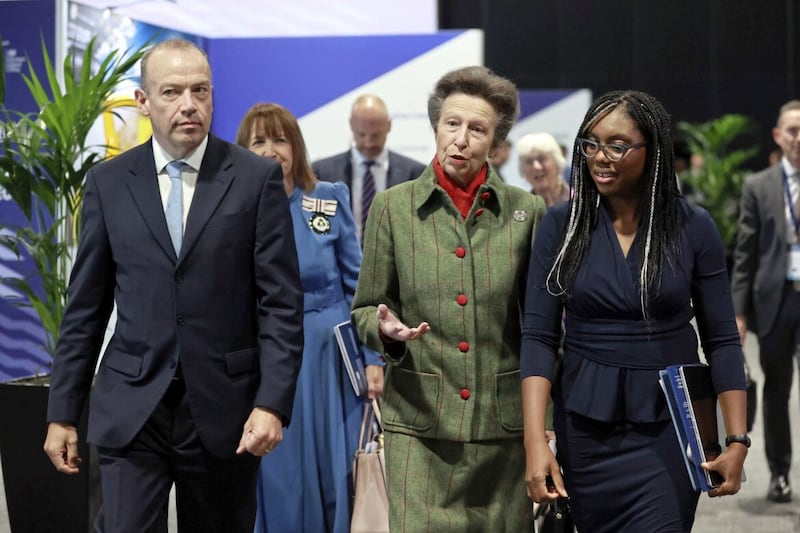LAST week we learnt that the threat of a local election will no longer hang over Northern Ireland during 2023. While there was little appetite for an election in the business community, getting the Executive back up and running again remains one of the single most important priorities for the local business community.
Political leaders have now been given "time and space" to find a compromise on the way forward. With key decisions about the Northern Ireland economy effectively 'on hold', that's something we urge them not to squander. Quite simply, if we want this region to thrive economically, political leaders must co-operate, collaborate, and agree on a strategic way forward for the economy and improving local living standards.
In last week's Financial Times, I was struck by an article about Barcelona and how such a vibrant economic hot spot had "lost its way". Since 2017, a range of economic factors were thought to have sapped the city of confidence, with levels of investment beginning to dwindle. As with all tourist destinations, the pandemic played an important role in the city's decline, but what has set Barcelona apart is its struggle to bounce back.
One of the key differentiators has been political stability. A constitutional crisis five years ago - leading to a contested referendum - has taken its toll on the city's reputation and economic prospects. The high-profile imprisonment of independence leaders and subsequent outbreak of rioting in once "affluent boulevards" has sown doubts among investors about the stability of a locale that would once be considered a 'sure bet' internationally.
This instability has created a political stalemate, with lack of co-operation across political divides clearly hampering investment in infrastructure and cultural attractions. Residents now report a feeling of insecurity, and the city has been experiencing an outflow of corporate investment with approximately 8,200 companies leaving the city. It was pointed out that businesses don't show their dissatisfaction by protesting in the street, but rather by pulling investment and exiting the local economy. Once gone, it's tough to get them back.
If that all sounds worryingly familiar, then I'm not surprised. What has happened in Barcelona provides an ominous warning for Northern Ireland's political leaders. Political stability and a region's reputation as a stable place to live, work and do business really matters to long-term economic activity. Continued instability can easily lead to a downward economic spiral and it's possible to get caught in a self-fulfilling loop of economic malaise. When firms start to choose other locations for their investment strategies, economic activity declines and there is less money to support public services. This in turn leads to young people leaving for more cosmopolitan areas with better job prospects, and the cycle continues.
Zero-sum politics has no place in an economy that is competing for global investment. Yet, for almost a third of its lifespan, that's where Northern Ireland has found itself. Households feel the pain of having no local leadership during a period of economic hardship, businesses are left frustrated as local economic priorities play a distant-second fiddle to political grandstanding. You just have to look at the way planning delays and underinvestment in key infrastructure projects - particularly water, sewage and energy networks - have put other transformative investments on the back burner.
While getting an Executive back is critical to our economic success; so too is getting an Executive team into office that is committed to ambitious economic growth. That is our second challenge. It's all too easy for politicians to choose the populist route, avoid taking hard choices and ignore the long-term consequences of bad decisions-making because of the short-term nature of election cycles.
Take the local health service as our example, it's now crumbling under the weight of overwhelming demand. From health service workers to unions, patients to local businesses, everyone knows it's a service crying out for modernisation and reform - particularly if we want to deliver the improved patient care everyone in Northern Ireland wants to see. But the only solution so far from local politicians has been to throw more money at the problem.
While pouring additional resources into an unreformed service might play well with voters, it actually makes things more expensive in the long-term as ever-increasing contributions to a swelling health budget crowds out other social and economic priorities. Schools, libraries and other under-funded public-services fall by the wayside, as does key growth-boosting investments in areas like transport, infrastructure and skills.
Infrastructure, in particular, really matters to our quality of lives. It's not only critical for health and safety - think of road gritting in winter, pothole maintenance and streetlights - but it's also a key lever of growth. When the basic infrastructure of a country is not maintained, it sends a strong signal to the public, to tourists and to investors that the region is failing.
On the other hand, modern, well-functioning infrastructure can be a magnet for investment. In the absence of the scale of public funding necessary to deliver transformative public infrastructure projects, the private sector has an opportunity to step-in and help fill the gap. But that requires coordination and local leadership - taking us back to our initial challenge.
While Northern Ireland remains a brilliant place to start and grow a business, the level of discontent about continued political instability is starting to increase month-by-month. In an era of fleet-footed capital, Barcelona provides a stark warning about where our current political stalemate could take us. That isn't a future any of us want to experience.
So, let's chart a better way forward by taking those tough decisions about public service reform, local infrastructure priorities and securing vital investment now. They've been put off for far too long. Politicians, it's over to you.
:: Angela McGowan is director of CBI Northern Ireland








